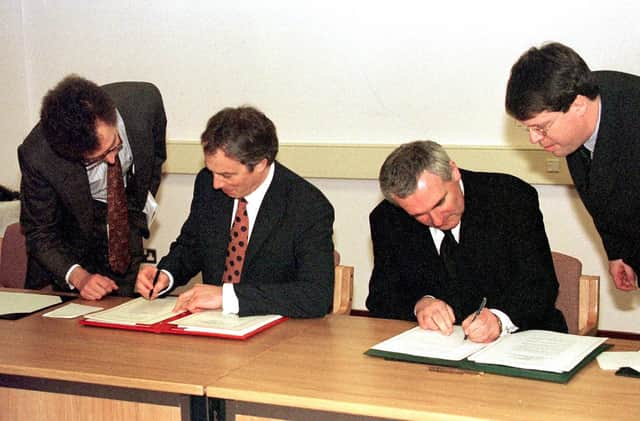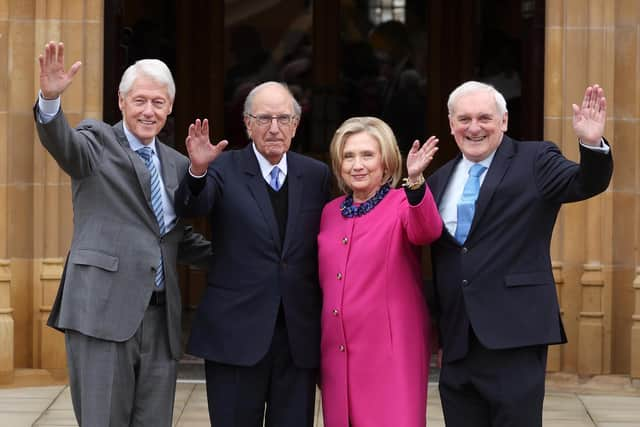Belfast Agreement @25: I do appreciate and respect unionist concerns and yet at the same time we have since 1998 a balanced accommodation, writes Bertie Ahern


This time 25 years ago, in the Spring of 1998, the people of Northern Ireland faced a momentous decision. After months of intensive negotiations, the British and Irish governments and the Northern Ireland parties had signed off on 10 April of that year on a historic deal – what became known as the Belfast or Good Friday Agreement – and now it was going to be the turn of the people to give their verdict in a referendum scheduled for May 22. In a unique development, not alone were the people of Northern Ireland going to the polls that day, but so were the people of the Republic, voting on the same agreement in historic parallel referenda.
As the respective heads of government, Tony Blair and I knew that for many people the decision to be made on May 22 would be a very difficult and painful one. I am thinking particularly of those who had lost loved ones during the conflict. One of the measures in the agreement was that, in effect, all Troubles-related prisoners would be out within two years. To be frank, I had real issues with that one myself, since among those due for release under those terms were people who had been convicted for the murder of Gardai in the Republic. I appreciated full well that similar conversations were happening in kitchens and meeting places all round Northern Ireland. Over 3,700 killings had left an enormous legacy of pain and suffering.
Advertisement
Hide AdAdvertisement
Hide AdBut Tony and I knew that on the positive side, the agreement also represented a unique chance to turn the page on that horrific catalogue of death and destruction. Very sadly, we could not bring back the dead. But we could ensure that the killing stopped. As leaders, we had a responsibility to the future as well as the past.


I want to take this opportunity to pay tribute to the leaderships of the Northern Ireland political parties at the time. As the representatives of the people of Northern Ireland, it was they who most directly heard and felt what people were saying on the ground. The agonised discussions, the misgivings about the price being paid – and yet at the same time the enormity of the prize available, a future of peace for Northern Ireland.
I totally respect that for many in the unionist community in particular, that price was seen as just too high. That saddened me that they thought so, but I understood and respected it. I still do today 25 years later.
For me in my own life, this time 25 years ago was also a sombre time. As many people know by now, my beloved mother Julia died on the Sunday before Good Friday. I was in the midst of the most challenging and important events of my political career and at the same moment I had to bury one of the people I was closest to in my life. And in doing so, I had to live with the regret that, despite my best intentions, I had not visited her the weekend she died. I will carry that regret to my own dying day. I say this not to seek sympathy, but merely to underline that I empathise totally with people in Northern Ireland and indeed around the island who were grieving loved ones as we approached May 22.
Advertisement
Hide AdAdvertisement
Hide AdWe all know how that vote went. In the event, 71.12% of the people of Northern Ireland voted for the agreement and so the new beginning commenced.
Over the last number of months, there have been many events commemorating the 25th anniversary of that moment in Northern Ireland history. Unfortunately, those commemorations have been clouded by continuing political disagreement arising from Brexit, the Northern Ireland Protocol and now the Windsor Framework.
As a regular reader of the News Letter and its thoughtful and considered coverage of Northern Ireland politics, I am well aware that many within the unionist community have had misgivings about the tone of the commemorations. While I have made no secret of my desire to see the Stormont institutions restored, let me make equally clear that I do appreciate that the concerns which have prevented the DUP from agreeing to their return are deeply and sincerely felt. I respect those concerns.
When I was first appointed to the Irish cabinet in 1987 it was as Minister for Labour. In that job, I was involved in the arbitration of numerous industrial disputes. In many ways, that is where I learned my trade as a negotiator. One early and obvious lesson – and it stood me in good stead all the way through the Good Friday talks – was that successful negotiations always end in compromise. Nobody gets everything they want, but the goal is to ensure everybody can leave the table with something they can live with. I also learned that compromise is enormously difficult. At the end of the process, very painful judgement calls have to be made. And that often the most difficult conversations are not with your opponent across the negotiating table, but rather with your own side.
All of these sentiments were in play 25 years ago.
Advertisement
Hide AdAdvertisement
Hide AdOne of the most contentious of the issues in front of us was the whole question of the status of Northern Ireland. The nature of that conundrum was well summed up in the Framework Document agreed between the two governments in February 1995 as their shared understanding of the challenges that would be faced by any talks process. It is worth quoting here, as these are not my words, but rather agreed language between the two governments at the time, under the leadership respectively of John Major and John Bruton:
“They (the two governments) acknowledge that in Northern Ireland, unlike the situation which prevails elsewhere throughout both islands, there is a fundamental absence of consensus about constitutional issues. There are deep divisions between the members of the two main traditions living there over their respective senses of identity and allegiance, their views on the present status of Northern Ireland and their vision of future relationships in Ireland and between the two islands … Both governments accept that agreement on an overall settlement requires, inter alia, a balanced accommodation of the differing views of the two main traditions on the constitutional issues in relation to the special position of Northern Ireland.”
In the agreement eventually reached in the Talks in 1998, we established that “balanced accommodation” on the status of Northern Ireland. This meant, in effect, while by virtue of the principle of consent, Northern Ireland would remain part of the United Kingdom, the way the sovereignty associated with that status was exercised made it different to the rest of the UK, reflecting its “special position” as defined in the Framework Document, and the principle of “rigorous impartiality” as between both major traditions enshrined in Article 1 v of the Belfast Agreement.
As a result of this new accommodation, my government recommended to the people of the Republic that we would change Articles 2 and 3 of our constitution, which contained a territorial claim on Northern Ireland and replace them with new articles embracing the principle of consent. They accepted that recommendation by an overwhelming margin and that change was made.
Advertisement
Hide AdAdvertisement
Hide AdThis was a major move by the South in terms of core constitutional doctrine, a fact graciously acknowledged in due course by unionist leaders like my old friends, sadly both now no longer with us, David Trimble and Ian Paisley.
The reason I mention this issue now is that I recognise, including from the pages of this newspaper, that a major residual source of concern for some unionists around the Windsor Framework is precisely this question of the status of Northern Ireland and how it is perceived to be affected by the framework. What I am seeking to do in this column is respectfully put on the table the reality that we addressed these questions 25 years ago and came to an understanding on them. In my view, we all accepted what I would call ‘The Principle of the Balanced Accommodation’.
I repeat that I acknowledge fully that the concerns of the DUP and others within unionism and loyalism around the Windsor Framework are sincere and need be addressed. But I ask that in doing so, due account is taken of the Principle of the Balanced Accommodation, a principle endorsed by the people of Northern Ireland in that historic referendum of May 22 1998 as their settled will.
The big picture here is that so much has been achieved over the last 25 years. In 1998, between us all, we found a way to stop the killing. That has been transformational in terms of lives saved and the space it has created for a Northern Ireland based on peace and prosperity. Without question, not every problem has been resolved and as we have seen over the last few years that politics remains deeply contested. But we are all united in our determination that, whatever the difficulties that remain, there will be no going back to the ways of the past to resolve them.
Advertisement
Hide AdAdvertisement
Hide AdI am very confident that in the same spirit of partnership and accommodation that prevailed in 1998, the two governments and the parties will find a way through these current challenges, so that the full promise of what the people voted for on May 22 that year can be realised and delivered.